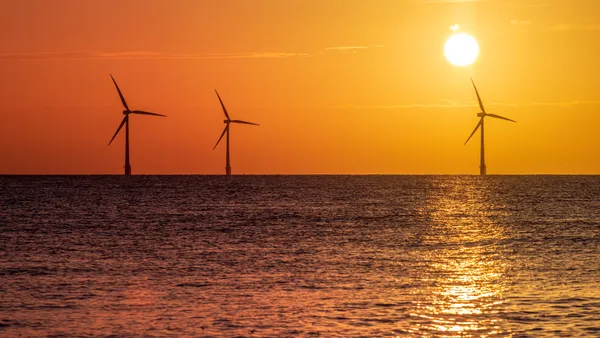Dive Brief:
- Tom Farrell, Dominion Energy CEO for the past 15 years, announced on Friday his transition to the role of executive chairman of Dominion's Board of Directors at the end of the third quarter, part of a "long designed succession process."
- The incoming president and CEO, Robert Blue, will report to Farrell starting Oct. 1. Blue served as an executive vice president and co-chief operating officer, a position created last September, and his fellow co-COO, Diane Leopold, will report to Blue and be promoted as sole COO.
- Dominion announced the shifts during its second quarter earnings call, along with an unaudited net loss of $1.41 per share, or $1.2 billion, determined in accordance with Generally Accepted Accounting Principles. The loss included a $2.8 billion charge related to the cancellation of the Atlantic Coast Pipeline. The company also sold its natural gas pipeline business to Berkshire Hathaway — a deal expected to close in Q4 for about $9.7 billion.
Dive Insight:
As the energy company grapples with the loss of a major gas pipeline project, Dominion is looking to a rapid shift toward clean energy.
"With our most recent strategic alignment and selling our gas storage and pipeline segment, embracing a clear path [to] net zero by 2050, the Board and I thought it would be an appropriate time to take the next step in our management transition at the end of this quarter," Farrell said during the Q2 call with analysts.
Dominion anticipates an increase in its renewable energy capacity by 2035, from 2.9 GW in 2019 to 28.3 GW. The increase represents a more than 15% compound annual growth rate on the assets, which include battery storage. While that includes one of the largest buildouts of offshore wind in North America — a 2.6 GW project off the coast of Virginia for $8 billion — most of the additions will be large solar builds in the PJM region, mainly in Virginia.
Dominion anticipates this shift to add more solar and wind power as part of its work to meet Virginia's 100% clean energy goals. Dominion announced it will become the third largest utility owner of solar in the U.S. by executing its latest 15-year integrated resource plan for Virginia.
In July, Dominion won approval from Virginia regulators to roll out a renewable energy tariff allowing large customers that had sought to exit Dominion's service to purchase 100% clean energy. Walmart, one of Dominion's largest customers in the state, fought the plan along with competitive electricity providers, arguing it would negatively impact competition for providing clean power, among other concerns.
Without the one-time charges, such as the loss based on the pipeline cancellation, Dominion reported $706 million in operating earnings, or $0.82 per share, compared to $619 million, or $0.77 per share, for Q2 2019.
Farrell reiterated the company's view regarding the continued need for natural gas.
Without the Atlantic Coast Pipeline, the Virginia, North Carolina and potentially South Carolina region are left without access to natural gas and "the need is not changed at all," Farrell said. The pipeline was over 90% subscribed by utility companies, which sought to "convert coal plants to natural gas facilities in the years to come. That need will now go unmet," he said.
Dominion's electric generation mix was made up of 42% natural gas in 2019, but the utility aims to pare that down to 26% in 2035, while increasing its renewable energy fleet and continuing to rely on nuclear power. Dominion has pipeline replacement programs in North Carolina, Utah, Ohio and West Virginia, according to Leopold.
For many stakeholders, the cancellation of the Atlantic Coast Pipeline brought up questions about other pending projects, such as the Mountain Valley Pipeline (MVP). Analysts asked Farrell about the implications for MVP, which is owned by a group including EQT Midstream Partners, NextEra Energy and Con Edison Transmission, not including Dominion. Farrell did not discuss the impacts.














